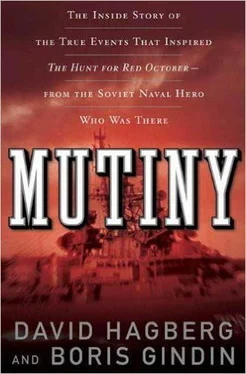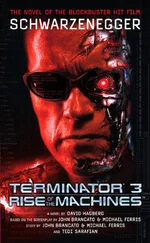Kovalev can hear the question now.
He flips a series of switches on his main transmitter, which will broadcast the tape to anyone with a military receiver monitoring this frequency.
But his hand hesitates at the switch that will start the message.
How will he answer the questions about his role in the mutiny? How will he defend his actions against his duties?
He hesitates a moment longer before flipping another series of switches that enables the encryption equipment to come on line. Only then does he switch the tape recorder on, and the reels begin to turn.
Sablin’s message is being broadcast from the Storozhevoy all right, but it is encrypted. No one but the navy will be able to understand what is being sent.
Sablin’s impassioned message to the people will never reach them.
Gindin sits on the deck, his back to the steel bulkhead, thinking about his father. It is early morning now. In a few hours the sky to the east will begin to lighten with the dawn. But that’s topsides. Here, in the small compartment, it could be night or day, except for the numbers on their wristwatches.
Some of the others are asleep on the floor. Their situation is essentially hopeless. They are at the mercy of Sablin and his armed crewmen just outside the door. Yet they must be feeling the pinch of no water by now. Or at least Gindin hopes so.
He can see his father’s face in the dim light. It is careworn, with a hint of the illness that has just ended his life. But in happier times he was an animated, happy man.
On the day the letter came announcing that Boris has been accepted into the academy, his father was grinning ear-to-ear as he dressed in his best clothes, his holiday suit. He knotted his tie just so, polished his shoes, brushed his hair, and kissed his wife on the cheek before he left the apartment for work.
Gindin remembers looking out the window as his father started down the street. But the old man didn’t get far before he crossed the street to talk to someone he knew. Later Gindin found out that his father was bragging to everyone he met about his son’s acceptance into the military school. He was going to be an officer! A Soviet navy officer! It was a red-letter day, in more than one sense. Boris was a good Communist and he was getting his just reward.
At work his father did the same, bragging to anyone who would listen.
Pushkin was a small town, so the word spread quickly that Boris had been accepted to the academy. By the next day he had become famous, the talk of the town, a Soviet hero.
But sitting with his back against the cold steel bulkhead he doesn’t feel much like a hero. He has been racking his brain all night to think of some way out of their predicament. He’s taken apart the water pump, but beyond that he can think of nothing else.
Earlier they’d banged on the hatch to get Shein’s attention. They’d hoped that somehow they could talk him into letting them go. Or maybe they could order him to open the door and then simply step aside. But he kept telling them to keep quiet; he didn’t want to listen to their threats or orders.
Gindin looks over at the others, some of them sleeping, heads cradled in their arms. He meets Captain Proshutinsky’s eyes.
“Quite a mess, huh, Boris?”
“Yes, sir,” Gindin replies.
He keeps going over in his mind what they—he—could have done differently in the midshipmen’s mess. Maybe if he’d realized sooner that Sablin was serious, that it wasn’t some kind of a political test, Gindin could have rushed the zampolit and knocked him on his ass. It would have ended the situation then and there.
Gindin can’t help but smile, thinking about his fist connecting with a superior officer’s chin.
He looks up and catches Proshutinsky’s eye again.
“What in God’s name have you got to be smiling about, Boris?” the captain lieutenant wants to know.
But it’s gallows humor, whistling past the grave. The old Russian proverb all the brave men are in prison seems apt at this moment. But how to explain that to Proshutinsky?
“I was thinking about my dad,” Gindin says. “I wish he was here. I’d like to ask his advice.”
Proshutinsky nods. “I know what you mean. I was sorry to hear about your father’s passing. We all were.”
“Thank you, sir.”
The Storozhevoy’s turbines have settled into a cruising speed, and by the feel of the ship’s motion Gindin knows that they are no longer in the river but have made it out into the open gulf. From there it is a matter of just a few hours before they will be out into the Baltic, in international waters. Then God only knew where Sablin would take them.
Sweden? Did their zampolit mean to defect to the West?
If that was the case, if Sablin tried to make a dash for the Swedish coast, the navy would not let him get that far. He would be ordered to come about or at least stop. If he refused such an order… Gindin lets the thought trail off for a few moments as he tries to figure out exactly what the Russian navy might do. Maybe the KGB would send ships after them. Or perhaps the air force would fly out.
Whatever happened, those ships and aircraft would be armed with live warshots, while the Storozhevoy had plenty of weapons but no missiles or ammunition except for the small-arms bullets.
What would his father advise? he wonders at that moment, but it dawns on him that his father wouldn’t have been able to give him much advice at all. This was a situation totally beyond the experience of a civilian.
“Pizdec,” Gindin mutters. This situation was even beyond the experience of a military officer. Stuff like this wasn’t supposed to happen in real life.
He gets to his feet and walks back to the smaller compartment. He has to take a pee, but he can’t bring himself to relieve himself in the corner like some of the others had. It stinks in here; he doesn’t want to make it worse.
He stares at the dismantled pump, thinking that there must be something else they can do. Something! Anything!
Proshutinsky comes to the doorway. “What is it, Boris? What are you thinking?”
“They’ll have to let us out of here sooner or later,” Gindin says carefully. The ideas are coming slowly.
“Da.”
Gindin turns to face the captain lieutenant. “No matter what happens, we must force the issue. We cannot remain locked up in here.”
“Someone could get shot and killed.”
“Yes, sir, I know that. But we have to do something. If we can get free we can release Captain Potulniy, and that would be a start. With the captain free we could fight back.”
Proshutinsky nods. “First we need to get out of here.”
Well before dawn Gorshkov arrives at the Kremlin, where he is passed through the Spassky Gate by the guards, who have been alerted by the admiral’s driver that he is arriving.
Brezhnev and Grechko have been notified that a matter of urgent national interest has unexpectedly come up. If the telephone calls had come from almost anyone else other than Admiral Gorshkov’s personal aide, the caller would have already been on his or her way to the prison at Lefortovo to answer questions about his or her sanity. Waking the Party General Secretary and the minister of defense at this ungodly hour is tantamount to suicide.
However, Gorshkov is not a man to be trifled with. If he were to declare that the sun rises in the west and sets in the east, the Communist Party and all Soviet military forces would seriously consider resetting their clocks.
The armed, uniformed guards in front of the Council of Ministers Block come to attention and salute the admiral as he gets out of his car and enters the building, which is all but deserted this morning. Two other long, black ZIL limousines are parked in front, one of them Brezhnev’s, the other Grechko’s.
Читать дальше












